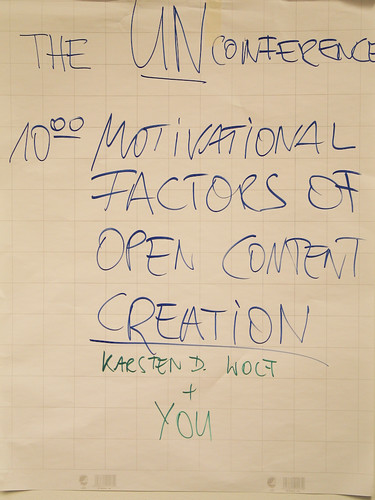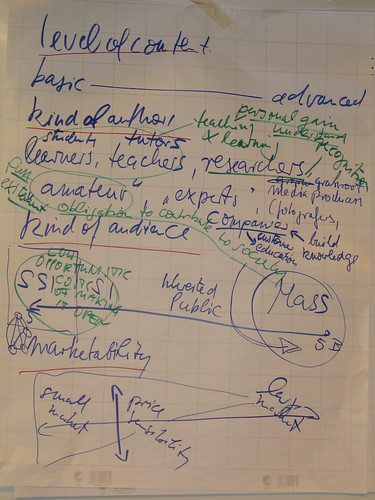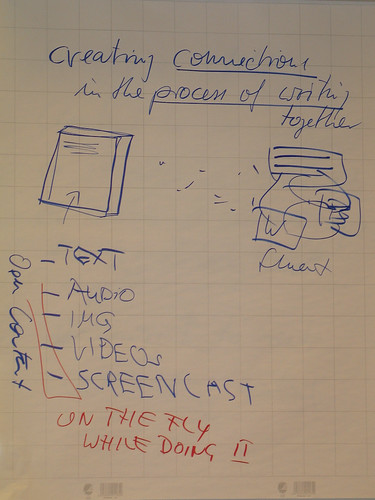Unconference Motivation of Open Content Authors
Lately I’ve been at ITK 2007 in Hämeenlinna, Finland (see also my presentation slides) where we had an “Unconference Track”.
What is an “Unconference”?
Teemu Arina proposed this idea to Jarmo Viteli and the organizing commitee of ITK07. The basic idea is to have an empty track where the conference visitiors can setup their own agenda. Often you have good ideas at the conference, not before the conference, so it is a kind of user driven conference with ad hoc meetings. Also there is much more brain in the audience than on stage, so why not give the people a more interactive format? There is quite a lot of information about “unconferences” on the Web, they form a subcategory of “large group didactics”. The most prominent method probably is Open Space and also World Café. To get more info on this, read the Unconference Blog, there is a Wikipedia article with a lot of other links, also look at Why unconferences are Fun conferences for more insight.
“My” unconference session
OK, an unconference session is a collaborative session of individuals interested to discuss some topic and to share the process and the outcomes with other people. To get started, head over to Flickr to see the slideshow for tag itk07unconference. Hans Poldoja from the LeMill team in Helsinki was kind enough to take the pictures of our session.
Session protocol
I proposed the unconference session much to early in the morning (the ITK come together was the night before and most participants didn’t get much sleep before 5 a.m.):

We started with 3 persons to grow into around 8 or 9 – small group, rich interaction. First we tried to identify criteria of content to make it more prone to be created in open settings:

- Open Content can be both of more basic or advanced level, they are all attractive to be open
- We identified a lot of potential authors: students, teachers, researchers, “amateurs and hobbyists”, experts, grassroot journalists, freelancing media producers.
- Why do they do it: besides altruism or citizenship, often it is about personal gain, be it learning, teaching, understanding, clarification, fun, excitement, promotion of something important to oneself, customer education, and especially recognition and making oneself known. So open content probably is not just about an obligation to society, but to make it work, people doing it should gain something by creating something other people can benefit from.
We then looked at the audience size, but came to the conclusion, that Open Content can be both SuperSpecialInterest (e.g. just a few people worldwide interested in something) up to mass audience (e.g. learning maths), from 5 readers to 5 billions, so to say. In SSI often the opportunity costs of making something open are low anyway (not much of a market), in mass media the recognition potential and the level of contribution to society is enormous). Loosely coupled with this dimension is the marketability of the content: if a lot of people want something, you end up with commodity contents and this is probably where the big foundations should put their money into to create excellent open content there. If you have very special interests with a low price sensitivity such as market reports there may be not too much potential for open content.
DRY(AO) and Snippets
I think we really got onto something when we talked about the ideal size of contents for open content. As Wikipedia shows, smaller “snippets” are much easier to start and collaborate on than to create monolithic contents, such as books. BUT obviously, having thousands of small snippets make it much more difficult to create coherent collections of content, so just having large repositories of content snippets does not ensure good textbook like quality.
We need those repositories or specialized search engines, though, because we have to implement D’ont repeat Yourself (DRY) and Others = DRY(AO) – don’t let all the energy of open content authors get wasted on repeating the old stuff again and again, so collaboration and open access to editing is a must.
Commented collections
With half of the LeMill development team in our session the idea developed to say Goodbye to open content books and say Hello to “commented collections” of open content snippets to build interesting content in short time. A very interesting idea and it resonates imho very well with all the hoopla about Personal Learning Environments, which could help to create some kind of “shared commented personal learning collections” trying to become Textbook 2.0.
Connecting content should be possible in the process of reading and collecting:

Copyleft/-middle/-right & developing minds license
In the discussion about copyright questions I really gut enthusiastic about a kind of “Developing Minds License”, meaning that you could partially open a content for educational use and make it proprietary for business use, but the other participants felt that Creative Commons already start to get too complicated.
General thoughts about the value of closed books
We closed the session with the question, if there is already enough content and we should start to clean it up and create meaningful collections. Depending on the subject the answer was a wholeheartedly “Nes!”, meaning that there will never be enough good content but that there is also a lack of using the existing materials. See the discussion above (snippets, DRYAO, PLEs).
Summing it up
Hey, this was a great session and I liked it very much. We should have done some inpromptu blogging and the conference should set up a wiki for the unconference, but all in all it was a very fresh experience to be able to discuss things which came up just over the course of the conference. There should be an unconference track at every conference!
Other questions I am still struggling with is:
“What is the special value of Open Content other than being free?”
The answer probably lies in the openess and the collaboration and the discourse, plurality of opinions, being building block for more content etc. The OSS scene has good answers to this.
“Is there still a place for Closed Content?”
I have recently become interested in R (the statistics package) to complement my statistical tool set (SAS JMP, Mathematica, KnowledgeMiner). I am very happy about this OSS project, but I was also very thankful that there a lot of excellent books about R and its application (especially in time series analysis). While there is a lot of material on the Net on R these (proprietary) books gave me very compact introductions and saved a lot of time for me – so I was willing to spend part of my book budget on them. Having written books and articles myself, I know what enormous effort went into the production of them. Would the authors have done it with no compensation? In the area of research and science: probably yes. But with the same effort? Probably no. Is the book as an artefact (which costs much more extra-budget money to produce than an online ressource) a more worthwhile object to produce? What is Your opinion? I will try to start some open book about using R in educational research to get more insight. I will keep you updated.
Happy content producing and DRY(AO)!
Am 16. May 2007 um 15:27 Uhr
[…] Unconferences: über eine Session auf der ITK07 zum Thema “Motivation von Open Content Autoren” berichte ich auf meinem Blog Didactalab. […]